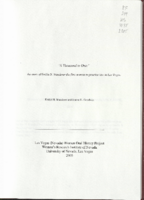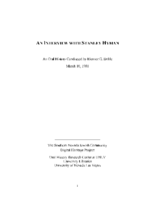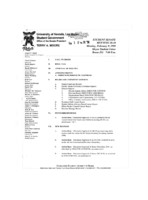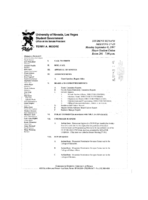Search the Special Collections and Archives Portal
Search Results

Transcript of interview with Lilly Fong by Annie Yuk-Siu Shum, February 29, 1980
Date
Archival Collection
Description
Text

Transcript of interview with Emilie Wanderer by Joanne Goodwin, 2000
Date
Archival Collection
Description
Emilie Wanderer was the first woman to establish a law practice in Las Vegas. She also helped to start a family court in Nevada with a social worker and a marriage counselor on staff. She and her son John were the first mother-son team to practice law in Nevada.
Text

Transcript of interview with Melody Stein by Barbara Tabach, August 16, 2016
Date
Archival Collection
Description
In this interview, Stein lovingly describes various forms and mediums of art, especially rubber stamping, which included starting and managing a related craft publication, National Stampagraphic, as well as working with polymer clay. She talks about her involvement with the local Polymer Clay Guild, of which she is president, and their various projects, including Bottles of Hope and Hearts for Heroes. Stein also discusses her teaching career at the Hebrew Academy and Adelson Educational Campus.
Text

Transcript of interview with Stanley Hyman by Eleanor Doble, March 10, 1981
Date
Archival Collection
Description
Interview with Stanley Hyman by Eleanor Doble on March 10, 1981. In this interview, Hyman discusses his job as a district manager for Farmers Insurance group, which brought him to Reno, Nevada in the 1940s, then to Las Vegas in 1951. He talks about the population growth of Las Vegas, and comments that the infrastructure of the city did not improve with the population growth. He also talks about some local disasters, the economy, entertainment, and the convention business in the area. He speaks briefly about recreation at Lake Mead and Mount Charleston, and atomic tests. The interviewer asks about women in leadership positions in hotels and in the insurance business.
Text

John D. Gieck interview, January 8, 1975: transcript
Date
Archival Collection
Description
On January 8, 1975, collector James M. Greene interviewed John D. Gieck (born January 1st, 1902 in Belle, Missouri) at his home in Boulder City, Nevada. In this interview Mr. Gieck discusses his various career changes throughout his life, including the building of Hoover Dam (Boulder Dam). He also discusses living in Boulder City from its beginnings as a town.
Text

Transcript of interview with Lawrence Hawley by Andy Sturgeon, March 13, 1981
Date
Archival Collection
Description
On March 13, 1981, Andy Sturgeon interviewed attorney Lawrence Hawley in his office on 302 East Carson Street, Las Vegas, Nevada. The two discuss how Hawley first came to Nevada, as well as his personal family history. Hawley describes Hoover Dam as it was being built, the effects of the Depression on Nevada, and how Las Vegas has grown in size. Hawley also discusses liquor laws and how practicing law has changed since he first moved to Nevada.
Text

Transcript of interview with John Erb by Susan Korzennik, February 23, 1980
Date
Archival Collection
Description
On February 23, 1980, Susan Korzennik interviewed construction worker John Erb (born on July 16th, 1932 in Denver, Colorado) in his home in Las Vegas, Nevada. This interview covers John’s construction work in the Las Vegas area in addition to family life in Nevada and local social, religious, and community activities. He also discusses being a member of the Elks Club and the Clark County Gentlemen’s Club.
Text

Proposal for the Xanadu Hotel and Casino (Las Vegas), October 30, 1975
Date
Description
Binder containing the proposal for the Xanadu resort, including conceptual sketches, pictures of mockups, and detailed proposal documents. Unbuilt project. Page 75 of proposal is missing. Stamped or labeled on back of photos: "Photography by Julius Shulman. P.O. Box 46206 Los Angeles, California 90046." Julius Shulman, photographer.
Image

Meeting minutes for Consolidated Student Senate University of Nevada, Las Vegas, February 9, 1998
Date
Archival Collection
Description
Text

Meeting minutes for Consolidated Student Senate University of Nevada, Las Vegas, September 8, 1997
Date
Archival Collection
Description
Text
